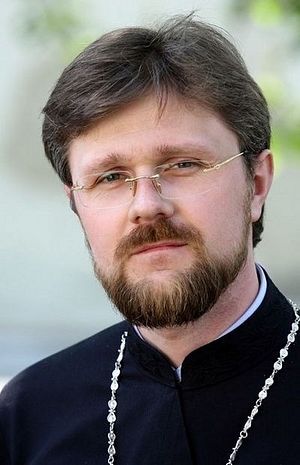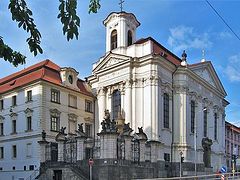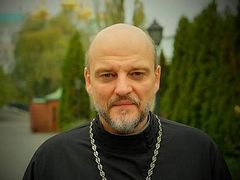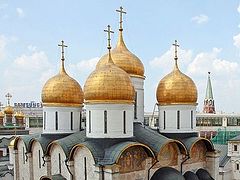Translator’s Note: One of the most complicated aspects of the Ukrainian Church crisis can be the terminology and details of Church government and canonical territories. In this article, the Deputy Chairmen of the Department for External Church Relations of the Ukrainian Orthodox Church, Archpriest Nicholai Danilevich, explains that the Ukrainian Church actually has more rights and freedoms, as an autonomous part of the Moscow Patriarchate, than some Churches which have been granted autocephaly by Constantinople. This he said via a post in the Ukrainian language from his Facebook page. The fact that the UOC enjoys more rights in the Moscow Patriarchate than some autocephalous Churches possess has been expressed by many, including the Metropolitan of Zaporozhye, and the Archbishop of Boyarka.
In this article, using the experiences of the Church of the Czech and Slovak Lands, and the Church of Greece, Father Nicholai demonstrates how the canonical UOC would almost certainly have more rights than the proposed “autocephalous”, “Single Local Church”, which Constantinople is attempting to form in Ukraine. While the UOC and those autocephalous Churches receive their myrrh, and have their primates confirmed from their respective Patriarchates, Fr. Nicholai notes the independent canonization of saints, and greater autonomy in the election of primates and bishops that the UOC enjoys, as an autonomous part of the maternal Russian Church.
What is the difference between the status of this “autocephalous church,” as it’s being propagated, and the status of the Ukrainian Orthodox Church?
This is not autocephaly; it’s a sham, deceit!
If you believe golos.ua, then according to them:
It is expected that the new Church will receive the status of an autocephalous archdiocese based on the model of the Orthodox Church of the Czech Lands and Slovakia. It will be independent in administration, but its myrrh and the confirmation of its elected primate would be received from Constantinople. The draft of the tomos has already included a provision for more than twenty representation churches1for the Ecumenical Patriarchate, which the President of Ukraine Petro Poroshenko promised to give before the start of the presidential elections.2
I don’t know for certain if this information totally true, but if you believe it (and there is reason to believe it), then just what is the difference between the status of this “autocephalous church,” as it is proposed, and the status of the Ukrainian Orthodox Church [of the Moscow Patriarchate]?
After all, if they’re calling the aforementioned list of rights as an autocephalous church, then our Ukrainian Orthodox Church is already autocephalous. What then is the difference in status? Because after all, the Ukrainian Orthodox Church also receives its myrrh from the Russian Orthodox Church, and the election of our primate is automatically blessed by the Patriarch of Moscow.
But whomever they elect as the head of this new “church” must be approved by the Patriarch of Constantinople. And as history testifies, based on the last intervention of the Patriarchate of Constantinople in the affairs of the Orthodox Church of the Czech Lands and Slovakia,[3] the candidacy of a new primate may not always be liked on the banks of the Bosphorus.[4]
A fully autocephalous Church chooses its primate by itself, which no one else has to approve.
Moreover, I suspect that other rights would also be limited. For example, the right to self-sufficient canonizations, which even the autocephalous Church of Greece does not have. When that Church intends to canonize a saint, she appeals with a request to Constantinople, and the canonization is passed there. One recent example is the canonization of Elder Iakovos (Tsalikis), who is buried on the island of Euboea.
But on the contrary, the Ukrainian Orthodox Church herself proclaims her own saints.
And then there is the matter of the diaspora—the right to open parishes abroad. The Church of Greece gave its diaspora away to Constantinople 100 years ago. There are no parishes of the Church of Greece in the diaspora—only parishes of the Patriarchate of Constantinople. And I do not think that this new “autocephalous church” will have these rights.
Also, the influence of the Phanar even on the election of ordinary bishops is not excluded. For example, the election of Metropolitans in Northern Greece goes through such a procedure. The Synod of the Church of Greece offers to Constantinople a list of candidates, and the Phanar chooses three of them, and from these three, Athens chooses the one.
Of course, I would like to note that the northern territories of the Church of Greece have a special status, something like a double subordination. But then again, cases of interference in these internal questions of the election of bishops were recently seen in the Czech Republic, where there is even an autocephalous Church. Therefore, I would not rule it out. Especially under the backdrop of already public information that Constantinople already is indicating to governmental and ecclesiastical officials who is to participate in the elections [in Ukraine], and who is not.
Therefore, there is the impression that the Phanar is going to just give some random thing and call it autocephaly. And in Ukraine they believe them, because they don’t know, or can’t work it out, or don’t want to understand and work it out—just as long as they get to be away from Moscow. And they don’t understand just what yoke they will fall into.
Respected sympathizers of the omos! Can you not see that you are simply being deceived? They promise one thing, but they are going to give something completely different!
And the twenty representation churches among the list of gifts from the authorities [of Ukraine] to Constantinople—how is that to be understood? This entire situation reminds me of the story of the Europeans who came several hundred years ago to the newly discovered lands of America and Australia and “traded” with the natives, giving them trinkets in exchange for gold.
His Beatitude Metropolitan Onuphry was right…





